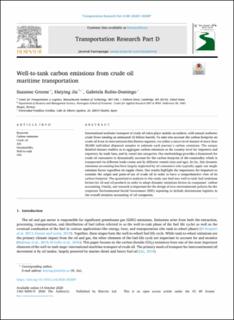| dc.contributor.author | Greene, Suzanne | |
| dc.contributor.author | Jia, Haiying | |
| dc.contributor.author | Rubio-Domingo, Gabriela | |
| dc.date.accessioned | 2020-12-29T13:46:38Z | |
| dc.date.available | 2020-12-29T13:46:38Z | |
| dc.date.created | 2020-10-07T20:42:30Z | |
| dc.date.issued | 2020 | |
| dc.identifier.issn | 1361-9209 | |
| dc.identifier.uri | https://hdl.handle.net/11250/2721076 | |
| dc.description.abstract | International seaborne transport of crude oil takes place mainly on tankers, with annual seaborne
crude flows totaling an estimated 12 billion barrels. To take into account the carbon footprint on
crude oil from its international distribution segment, we utilize a micro-level dataset of more than
28,000 individual shipment samples to estimate each journey’s carbon emissions. The unique
detailed dataset enables us to aggregate carbon emissions at the country level for importers and
exporters, by trade lane, and by vessel size categories. Our methodology provides a framework for
crude oil consumers to dynamically account for the carbon footprint of the commodity which is
transported via different trade routes and by different vessels (size and age). So far, this dynamic
emissions accounting has been largely neglected by oil consumers who typically apply one single
emission factor regardless its supply chain. Our results highlight the importance for importers to
consider the origin and point-of-use of crude oil in order to have a comprehensive view of its
carbon footprint. The quantitative analysis in this study can feed into well-to-tank fuel emissions
factors for oil and oil products in order to adopt dynamic emissions factors in companies’ carbon
accounting. Finally, our research is important for the design of new environmental policies for the
corporate Environmental Social Governance (ESG) reporting to include downstream logistics in
the overall emission accounting of oil companies. | en_US |
| dc.language.iso | eng | en_US |
| dc.rights | Navngivelse 4.0 Internasjonal | * |
| dc.rights.uri | http://creativecommons.org/licenses/by/4.0/deed.no | * |
| dc.subject | carbon emissions | en_US |
| dc.subject | crude oil | en_US |
| dc.subject | AIS | en_US |
| dc.subject | sustainability | en_US |
| dc.subject | well-to-tank | en_US |
| dc.subject | ESG | en_US |
| dc.title | Well-to-tank carbon emissions from crude oil maritime transportation | en_US |
| dc.type | Peer reviewed | en_US |
| dc.type | Journal article | en_US |
| dc.description.version | publishedVersion | en_US |
| dc.source.volume | 88 | en_US |
| dc.source.journal | Transportation Research Part D: Transport and Environment | en_US |
| dc.identifier.doi | 10.1016/j.trd.2020.102587 | |
| dc.identifier.cristin | 1838053 | |
| dc.relation.project | Norges forskningsråd: 280684 | en_US |
| cristin.ispublished | true | |
| cristin.fulltext | original | |
| cristin.qualitycode | 2 | |

